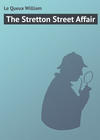Loe raamatut: «The Under-Secretary», lehekülg 13
She, a woman of infinite tact and finesse, had suffered bitterly from the harsh words he had spoken weeks ago, yet she had never upbraided him. She had suffered in patience and in silence, as the true woman does when the man she loves causes her unhappiness. Jealousy may engender fury; but the woman whose soul is pure and whose heart is honest in her love is always patient and long-suffering, always willing to believe that her ideal is represented by the man she loves. And it was so with Claudia. Gossips had tried to injure her good name by alleging things that were untrue, yet she had never once complained. “Tiens!” she would exclaim. That was all. It was true that she had allowed herself to flirt with the young Russian because, being a woman, she could not resist that little piece of harmless coquetry. Nevertheless she had never for a single instant forgotten the sacred love of her youth.
She was essentially a smart woman, whose doings were chronicled almost daily in the fashionable intelligence of the newspapers; and every woman of her stamp may always be sure of being persecuted by malignant gossips. Were she a saint she could not escape them. The eternal feminine is prolific of aspersions where a pretty member of its own sex is under examination, and especially if she be left lonely and unprotected while she is still quite young. It was so with Claudia Nevill. She allowed people to talk, and was even amused at the wild and often scandalous tales whispered about her, for she knew that the man she loved would give no credence to them.
Dudley had loved her long ago in her schoolgirl days, and she knew that he loved her now. For her, that was all-sufficient.
But his preoccupied manner that night caused her considerable apprehension. He was not his old self. Once, while at dinner, she had caught a strange, haunted look in his eyes.
“Tell me, Dudley,” she urged, holding his hand and looking earnestly up to him. “Be frank with me, and tell me what ails you.”
“Nothing,” he laughed uneasily, carrying her soft hand to his lips. “But whatever made you ask such a question?”
“Because you seem upset,” she answered, smoothing his hair tenderly from his brow. “If there is any matter that is worrying you, why not confide in me, as you have done so often before, and let me help you.”
“No, really,” he protested with a forced laugh.
“Nothing worries me – only matters down at the House.”
She looked at him in silence. In those dark, brilliant eyes of hers was a love-look that was unmistakable. She was a woman believed by men to be utterly frivolous and heartless, yet she loved Dudley Chisholm with all the fierce passion possible to her ardent soul. His face told her that he had been suffering in her absence, and she strove to discover the reason.
“Why, Dudley,” she exclaimed at last, “now that I reflect, you have not been quite the same since the midnight visit paid you at the castle by the mysterious man who was so very careful that his presence should not be made known! You have never told me who he was, or what was his business.”
He started so quickly that she could not fail to notice it. This set her wondering.
“Oh!” he replied with affected carelessness next moment, “the tall shabby man who called on the night of the dance you mean? He was a confidential messenger, that was all.”
“I suppose I was mistaken, but his face and voice both seemed quite familiar to me,” she remarked. “I meant to tell you before, but it entirely slipped my memory. The likeness to some one I have met was very striking, but I cannot recollect where I’ve met him before. Is he an official messenger?”
“Yes,” answered her lover vaguely, although alarmed that she should so nearly have recognised Cator; “he’s attached to the Foreign Office. I urged him to stay the night, but he was compelled to return at once to town.”
“And he brought you some bad news? Admit the truth, dear.”
“He certainly brought some official intelligence that was not altogether reassuring,” her lover said.
“Are you quite certain that it was official, and did not concern yourself?” she asked in a low voice which sounded to him full of suspicion.
“Certain? Why, of course,” he laughed. “Whatever strange ideas are you entertaining, Claudia?”
“Well,” she answered, “to tell the truth, Dudley, I have a notion that he came to see you on some private business, because ever since that night you have been a changed man.”
“I really had no idea that. I had changed,” he said. “You surely don’t mean that I have changed towards you?”
“Yes,” she answered gravely, her small hand trembling slightly in his nervous grasp, – “yes, I think you have changed – even towards me.”
Chapter Twenty Four.
Contrasts Two Loves
When a woman of Claudia Nevill’s passionate temperament loves, it is with her whole soul. The women with dark flashing eyes, red lips, arched brows, and oval countenances can never do things by halves. They either love fiercely, or else are as cold as ice; they hate with all the vindictiveness of hell, or are patient, forbearing and forgiving to the end. Dudley Chisholm knew this well enough, and was aware how deep and devoted was the love of the true-hearted woman from whom he had tried to part, but without whom there seemed a void in his life.
Because gossips had maligned them he had striven, for her sake as well as his own, to put an end to their affection. His words had pained him and had stabbed her cruelly, but they had turned out; to be inconclusive. Their lives were bound together, as she had so frequently declared.
Now that she had approached the subject, he longed to tell her of the secret in his heart. But how could he when he had made that strange, unholy compact with that woman, her rival, who now held his future in her hands?
With an effort he put such thoughts aside, and with feigned carelessness strove to assure her that he was in no wise changed. When, however, a woman really loves, it is difficult to deceive her. She reads man’s innermost thoughts as clearly as though they were written upon an open page. The wavering of the eyes, the twitching of the lips, the slight movement of the muscles of the face, and the well nigh imperceptible swelling at the temples, although entirely unobserved by the woman who is not in love, are plain and open declarations of the truth to her who loves the face exhibiting these subtle signals. Truly the feminine intuition is marvellous and inexplicable.
Dudley knew that to lie to her was impossible. Little by little he managed to convince her that his mysterious visitor had come from the Foreign Office. At length he succeeded in turning their conversation into a different channel.
At his request she crossed to the grand piano at the end of the magnificent room in which there were so many signs of her exquisite taste, seated herself at the instrument, and played Mendelssohn’s “Rondo capriccioso” and Chopin’s “Valse Op. 70.”
Though he made an attempt to turn over the leaves of the music, he found it difficult to keep himself from becoming absorbed in reverie. What, he wondered, could she suspect? Surely the woman into whose hands he had given himself had told her nothing. No. Had she not promised in the most emphatic manner that no word of his terrible secret should pass her lips? As she had already exhibited marvellous cleverness and diplomatic finesse, he felt confident of her discretion and silence.
He looked down at the dark-haired woman seated at the piano and thought how her loveliness would have delighted Greuze. As her slim fingers, laden with sparkling gems, ran swiftly and dexterously over the keys, her lawny bosom rose and fell, the diamonds at her throat glittered with iridescent fire, and the sweet odour of the violets added one more to the many charms thus spread for him. She had taken three or four of the flowers from her breast, and with a single leaf had made up a tiny bouquet, afterwards placing it in the lappel of his coat, as was her tender habit when they were alone. And he was actually deceiving this affectionate woman, who had been his friend, confidante, and adviser ever since their days of childhood!
He stood behind her, clenching his teeth, hating himself for his duplicity.
Did he really love her, he asked himself for the thousandth time? Yes, he did. She was all in all to him. Their love had always been idyllic. In his eyes no woman was half as fair to look upon; none so full of innate grace and chic; none so sweet in temperament or so full of charms. Fate had parted them, it was true, and she had married Dick Nevill, his best friend. Yet he had never ceased to love her – though to her dead lord she had been a model wife during their too brief period of wedded happiness.
When Dick died he had, at Claudia’s own request, gone back to her to become her platonic friend, to cheer her in her loneliness, and to advise her in the hundred and one matters which concerned her future. And again she had grown to love him; again she had worshipped him as her ideal.
She had finished the valse, and, turning slowly, raised her perfect face, slightly tragic in its dark beauty, with a mute invitation for his caress. He placed his hand tenderly upon her shoulder and bent until his lips touched hers. And as he did so, he saw in her bright eyes that calm expression of tranquil content which comes to such a woman in the thrill engendered by her lover’s kiss.
She rose from the music-stool. Once more he held her in his arms, as he had so often done of old, while she, in that soft voice he knew so well, tried to teach him the height and breadth and depth of her love.
“I know what people say, Dudley!” she exclaimed, hoarsely. “Tant mieux! I know that odious reports have reached you regarding me, but surely you will trust me? Cannot you see for yourself, dear, that I am yours – entirely yours?”
“Words are unnecessary, Claudia,” he answered, kissing her. “That you love me I have never doubted; I give no credence to anything I hear. I trust in you implicitly.”
“Then if that is so, dear, why not be perfectly frank and tell me the reason of your sadness?” she urged.
“I am not sad, Claudia,” he protested with a feigned air of gaiety. “How can I be sorrowful when I know that I possess your love?”
“It is not sufficient that you have my affection,” she answered. “I wish to continue to be your confidante and friend. Recollect that a woman’s wit is often of value to a man engaged in public life as you are.”
“I know my debt to you is more than I can ever repay,” he declared frankly. “To your good counsels and personal interest all my success is due. I owe all to you – everything.”
“And in return you have given me your love, the sum of my desire,” she said contentedly, slowly raising her lips and kissing him. “You are mine, Dudley, and you will ever remain so – won’t you?” He held his breath for an instant. Then, as he twined his arm round her slender waist, he said:
“Of course, darling, I shall ever remain yours, always – always.”
He lied to her. Faugh! he hated himself. For the first time he had uttered a deliberate falsehood concerning their love; and he felt positive she knew that he had not spoken the truth. So close had been their association for many years, unbroken save for the few months of her married life, that they read each other’s unuttered thought and knew each other’s innermost secrets.
Long ago she had laid bare her whole heart to him, concealing nothing, and not seeking to excuse herself for any of those flirtations which from time to time had been the talk of the town. He knew everything, and had in return repeated his declaration of love for her. Indeed, after that long friendship the life of each was void without the other. When parted from her by reason of her country visits, there somehow seemed a blank in his existence, and he found himself thinking of her night and day. Until her last absence in Paris it had been their custom to write to each other every second day.
How; would she act if she knew the truth? What would she think of him if she were aware that he had promised himself to another woman, and one who had come into his life so suddenly, if she continued to shield him from the exposure of his guilty secret? Her dark eyes, those splendid eyes everywhere so greatly admired, were turned upon him. There was an air of sweet sadness in their expression. His eyes fell: he could not meet her gaze.
“Do you know, Dudley,” she exclaimed at last in the soft, sweet voice he was never tired of hearing, the voice that had so often consoled him and encouraged him to strive after high ideals, – “do you know, dear, I have lately thought that your people are endeavouring to part us. You recollect your sudden refusal to see me last autumn? Your cruel action put fear into my heart. I am dreading always that I may lose you – that you will listen to the well-meant counsels of your relations and cast my love aside.”
He saw by her countenance how terribly in earnest she was, and hastened to reassure her.
“No, darling. All that is a foolish fancy. You may rest quite assured that as I have not already listened to the advice of people who are in ignorance of the platonic nature of our friendship, I shall never do so. We have been lovers ever since our teens, and we shall, I hope, always so remain.”
She sprang upon him, clasping her soft arms around his neck, and, kissing him with a fierce and fervent passion, exclaimed:
“Thank you, Dudley! Thank you for those words! You know how fondly I love you – you know that I could not live without frequent sight of you, without your good counsels and guidance – for I am but a woman, after all.”
“The best and bravest little woman in all the world,” he declared in words that came direct from his heart. Then, pressing her closer to him, he went on: “You surely know how deep and complete is my affection, Claudia. The test of it is shown by the fact that were it not for my love for you I should have forsaken you months ago in order to save my reputation – and yours.”
“It was a foul calumny!” she cried quickly. “The lie was probably started by some woman who envied me. But a scandal is like a snowball – it increases as it is rolled along. We invited gossip, and lent colour to the report by being seen so much together. I know it too well, and I have regretted it bitterly for your sake. With a public man like yourself a scandal is very apt to put an end for ever to all chances of high position. Knowing that, I, too, tried hard to cut myself adrift from you. Ah! you cannot know, Dudley, what I suffered when I attempted self-sacrifice for your own dear sake. You can never know!” she went on, panting and trembling. “But you misjudged me – you believed me fickle. It was what I intended, for I wanted you to cast me aside and save yourself.”
“Well?”
“They spoke of my flirtations en plein jour at Fernhurst,” she continued, looking up into his face with an expression full of passionate love. “The report, with exaggerations, reached you as I had hoped it would, but although it caused you pain it made no difference to your affection. Therefore, I failed, and we were compelled to accept the inevitable.”
“Yes, Claudia. What I heard from Fernhurst did pain me terribly,” he answered very gravely. “Yet I could not believe without absolute proof that you, whom I knew to be an honest, upright woman, would deliberately create a scandal, knowing well that it would be reflected upon me. I knew that you loved me; I knew that our lives were firmly linked the one to the other, and that our mutual confidence and affection were based upon a sure foundation. That is why I refused to give credence to the scandalous gossip.”
Her small hands trembled with emotion, and as she pressed her lips to his, mutely thanking him for his forbearance and refusal to believe ill of her, she burst into tears.
“I know, dearest, how terribly you have suffered,” he said in a low voice as he tried to console her. “I know well that your position as a smart woman supplies your enemies with opportunities for wounding your reputation. In the clubs men will, with an idle word, take away a woman’s good name, and often think it a huge joke when they hear the despicable calumny repeated. Indeed, it seems an unwritten law nowadays, that the woman who is not talked about and who does not hover between sacraments and scandals, is not to be considered smart. If she gives dinners and supper-parties at the Carlton or Prince’s, her name is usually coupled with one of her favourite guests. No woman is really in the running without gossip having ungenerously given her a lover.”
“Yes,” she answered, “that is only too true? Dudley. I know quite well that the happiness of many a smart woman, as well as her domestic comfort has been utterly wrecked by the eternal chatter which follows public entertaining. A short time ago we gave dinners in our own houses, as our mothers used to do; but that is all of the past. The glitter of the big restaurants has attracted us. To be chic one must engage a table at Prince’s or the Carlton, smother it with flowers, and dine with one’s guests in the full glare of publicity in a hot and crowded room, where the chatter is so incessant that one can scarcely hear one’s own voice. The Italian waiters rush through the courses as if they wish to get rid of you at the earliest possible moment; there is clatter, noise, an inordinate perfume of cooked food, and a hasty gobbling up of gastronomic masterpieces. I am compelled to give my dinners amid such surroundings, but how I hate it all! For me it is only an ordeal – just as are your political dinners with your friendly working-men.”
He smiled as he recollected what he had so often suffered from the “tuppenny smokes” of his constituents.
“The restaurant dinner of Aristocrats and Anonymas is a terrible feast,” he said. “I suppose the new fashion of entertaining was started by the nouveaux riches because after the public feast there appeared in what are called the fashionable columns of the papers paragraphs, supplied by the restaurants, informing London’s millions that Mrs So-and-So had been entertaining a big party, among the guests at which were Lady Nobody, who was exquisitely dressed in black velvet and old lace, and Lord Somebody, who was looking younger than ever. You know the style.”
She laughed outright at his candid criticism, which was so thoroughly well deserved. Half the dinners, she declared, were given by adventurers from the City to needy men with titles, which were wanted to lend lustre to prospectuses. And the whole affair had been so cleverly engineered by the manager of the restaurants, who nightly gave paragraphs to the journalists, thus glorifying the givers of feasts and flattering the guests, that a mode had actually been created, and even the most exclusive set had been compelled to follow it, royalty itself being often among the diners.
At his request she re-seated herself at the piano, and to disperse the melancholy that had settled upon him she sang with infinite zest the latest song of the Paris café-concerts which had been made famous by the popular chanteur, Paulus, at the Ambassadeurs’. The chorus ran as follows:
“Ah! Monsieur Chamberlain, ça n’etait pas malin,
Les femmes de l’Angleterre ell’s manqu’nt de militaires
D’leur absenc’ tout l’mond’ se plaint.
Car ils sont rigolos, avec leurs p’tits polos.
A London je le confess’ on admir’ leur gentiless
Quand ils march’nt entortillant, en entortillant leur… yes.”
The grave-faced Jackson entered and with pompous ceremony served him with a whiskey and soda, as was usual; then, after she had sung to him another chanson, he rose to go. As it was already late, and as he was obliged to return to the House, he was compelled to take leave of her.
“You really love me, Dudley?” she asked in a low, intense voice, as they stood locked in each other’s arms just before he left. “Tell me that you do. Somehow I am so apprehensive, foolishly so, perhaps; but your words always reassure me. I feel happier and a better woman after hearing them.”
“Love you, Claudia?” he cried, his hand stroking her beautiful hair; “how can you ever doubt me? I swear by all I hold most sacred that no tender thought of any woman save yourself ever enters my heart. I am wholly and entirely yours.” And he kissed her with all the fervent passion of an ardent lover.
“And you will never desert me – never? Promise!” she said, in tones breathing anxiety and earnestness.
“I promise,” he answered. His voice had lost a little of its resonance, but she did not notice the slight change. He made a promise which he himself knew to be incapable of fulfilment. Hers no longer, he was now helpless in the inexorable toils of that mysterious woman who alone held his secret.
She kissed him again in fond farewell. Outside in the great hall, which was famous for its fine marble columns and statuary, the man helped him on with his coat, while Claudia stood above upon the terrace of the upper hall, laughing gaily and wishing him “good-bye” as was her wont. Then he went forth in a dazed condition, walking along Knightsbridge in search of a passing hansom to take him down to the House.
As the door closed behind him when he emerged from the great portico into the foggy night, the short, dark figure of a rather thin man in a soft deer-stalker hat and dark overcoat slunk quickly out of the shadow of a doorway almost opposite, crossed the road, and hurried after him with laboured breath.
Of a sudden as Dudley, having gone a hundred yards or so, turned to glance behind him for an approaching cab, he came face to face with the fellow who, if the truth were told, had for nearly two hours been patiently awaiting his appearance.
“Pardon, signore!” exclaimed the black-haired, sharp-featured man, speaking with a decided Italian accent. He was somewhat taken aback by the abrupt termination of his rather clumsy efforts at espionage. “I beg the signore a thousand pardons, but may I be permitted to have a parolina (little word) with him?”




















